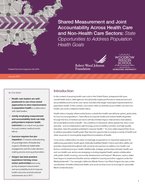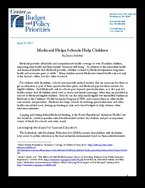Found 17 resources.
0
0
0
Every child in an early childhood setting should have a teacher with specialized education to promote that child’s cognitive, social, emotional, and physical development and who prepares them for success in school and in life. The National Research Council’s report from a panel of experts, Transforming the Workforce for Children Birth Through Age 8: A Unifying Foundation, lays out several recommendations for programs serving children from birth through age 8, notably that teachers "should have at a minimum a bachelor’s degree and specialization in the knowledge and competencies needed to...
Topics: Early childhood, Education, Post-secondary
 Shared by Kirsten Greenwell
on Jun 30, 2021
Shared by Kirsten Greenwell
on Jun 30, 2021 0
0
0
Colleges support students with advising, counseling, or coaching in academics and other skills they need to succeed in school. Some colleges enhance those services through reduced adviser caseloads and more comprehensive, frequent guidance, which can improve students’ semester-to-semester retention and average credits earned. This overview describes important lessons on designing and implementing those services. College leaders and administrators committed to designing, building, managing, and continually supporting enhanced advising services can consult this checklist of recommendations as...
Topics: Attendance, Child welfare, Community development, Education, Grade-level proficiency, Post-secondary, Workforce development
 Shared by Housing Is
on Mar 4, 2021
Shared by Housing Is
on Mar 4, 2021 0
0
0
A brief to help state and local agencies identify opportunities to align and leverage policies, programs, and funding across the three laws to support the education-to-workforce pipeline; a workbook to facilitate cross-agency conversations to identify and plan for alignment opportunities across ESSA, Perkins V, IDEA and WIOA; and an interactive tool that identifies specific language in the laws that address college and readiness topics and help state education agencies and local education agencies find new or greater alignment opportunities in their plans.
Topics: Asset building, Education, Legislation & Policy, Post-secondary, Workforce development, Youth
0
0
0
This annotated resource compilation is intended to help state and local agencies access information and resources needed to better understand the federal legal protections and requirements associated with datasets collected by federal agencies or as part of a federally funded program.
Topics: Data sharing, Disabilities, Early childhood, Education, Health, Homelessness, Legislation & Policy, Post-secondary
0
0
0
The potential impacts of expanding the regulation known as “public charge” have yet to be fully understood, but experts anticipate that young children in immigrant families—more than 90 percent of them US citizens—could be disproportionately affected. The proposed rule could make it more difficult for noncitizens to obtain green cards or temporary visas by negatively weighing several factors during the immigration admissions process, including current or potential participation in safety net programs such as Medicaid and the Supplemental Nutrition Assistance Program.
Topics: Child welfare, Early childhood, Education, Food insecurity, Housing, Immigrants, Legislation & Policy, Low-income
0
0
0
More than 56 million people live in communities that are classified as high opportunity areas. These neighborhoods often provide access to certain amenities or community attributes that are believed to increase economic mobility for their residents. However, they are also often encumbered by high costs of living and dense populations. As a result, the supply of affordable housing is unable to support the demand. In an effort to combat this, there has been an increased focus from research, policy and affordable housing groups on deconcentrating poverty and promoting affordable housing in high...
Topics: Education, Health, Housing, Low-income, Mobility, Safety
0
0
0
Colleges and higher education systems can make institutional policy changes to bolster the success of students who are parents and their families through intentional use of a two-generation approach. This brief focuses on traditional two-year and four-year baccalaureate pathways for students who are parents; it complements a brief released on policy solutions.
Topics: Dual-generation, Education, Low-income, Partnerships, Post-secondary, Youth
0
0
0
There are opportunities for federal and state policies to better support postsecondary institutions in serving students who are parents and their families. Policymakers can incentivize partnerships, name students who are parents as special or target populations, and facilitate financial aid processes that address the needs of families. Where possible, policies can also encourage creative and innovative approaches to leveraging existing programs to facilitate access and successful completion for parenting students. These recommendations seek to promote policy changes that address the critical...
Topics: Dual-generation, Education, Legislation & Policy, Partnerships, Post-secondary, Research, Workforce development, Youth
0
0
0
This brief highlights evidence about early care and education (ECE) access and presents a policy-focused research agenda designed to fill knowledge gaps in three areas: (1) documenting disparities in access to and participation in ECE, (2) identifying and assessing innovations to reduce disparities, and (3) identifying and testing strategies to scale up effective ECE programs.
Topics: Early childhood, Education, Legislation & Policy, Low-income, Research, School-readiness
0
0
0
Topics: Child welfare, Early childhood, Education, Health, Homelessness, Low-income, Pre-natal
0
0
0
This short document provides basic information to help housing and homeless assistance providers advocate with their families and youth for appropriate educational services, from birth through higher education. The rights and protections outlined here apply to all children and youth experiencing homelessness, as defined by the education subtitle of the McKinney-Vento Act.
Topics: Disabilities, Dual-generation, Early childhood, Education, Family engagement, Homelessness, Housing, Legislation & Policy, Low-income, Post-secondary, Youth
0
0
0
This brief outlines how state agencies can employ shared measurement and joint accountability across sectors as tools for improving population health outcomes. States can use these tools to drive coordination of preventive efforts and broaden the boundaries of population health achievements that no sector, or isolated incentive, can achieve alone.
Topics: Child welfare, Data sharing, Education, Family engagement, Health, Housing, Low-income, Metrics
 Shared by Housing Is
on Aug 9, 2018
Shared by Housing Is
on Aug 9, 2018 0
0
0
Federal rules on immigrant youth and families are changing rapidly, from Deferred Action for Childhood Arrivals (DACA) to Temporary Protected Status (TPS). This brief provides basic information about eligibility for education services, and practical suggestions for schools.
Topics: Child welfare, Education, Immigrants, Legislation & Policy
 Shared by Housing Is
on Aug 9, 2018
Shared by Housing Is
on Aug 9, 2018 0
0
0
The Every Student Succeeds Act of 2015 (ESSA) amended the McKinney-Vento Act’s Education for Homeless Children and Youth program, as well as Title I, Part A of the Elementary and Secondary Education Act. The ESSA amendments include many provisions designed to improve training, identification, enrollment, stability, and
success, from pre-school through high school, and the transition to post-secondary education. A brief summary is provided.
Topics: Early childhood, Education, Homelessness, Legislation & Policy
 Shared by Housing Is
on Aug 9, 2018
Shared by Housing Is
on Aug 9, 2018 0
0
0
Children’s HealthWatch's brief "asks two straightforward questions: If health starts at home, what are the healthcare and educational costs of unstable housing? Which policy solutions could create stable homes for healthier families?"
Topics: Asthma, Child welfare, Dental, Early childhood, Education, Foster care, Grade-level proficiency, Health, Healthy homes, Housing, Lead, Literacy, Low-income, Medicaid / Medicare, Obesity, Partnerships, Pre-natal, Preventative care, Racial inequalities, School-readiness, Stability, Vision, Youth
 Shared by Steve Lucas
on Jul 10, 2018
Shared by Steve Lucas
on Jul 10, 2018 0
1
1
For eligible children, Medicaid pays for the medical services schools provide to students with disabilities so they can get an education.
Topics: Child welfare, Education, Medicaid / Medicare
 Shared by Steve Lucas
on Apr 19, 2017
Shared by Steve Lucas
on Apr 19, 2017 0
0
0
Supporting parents' efforts to help their children develop during the preschool years improves a child's school readiness, reduces behavior problems, enhances social skills, and promotes academic success.
Topics: Early childhood, Education, Family engagement, School-readiness
 Shared by Abra Lyons-Warren
on Feb 16, 2017
Shared by Abra Lyons-Warren
on Feb 16, 2017 

